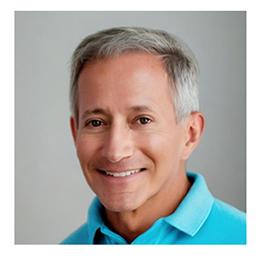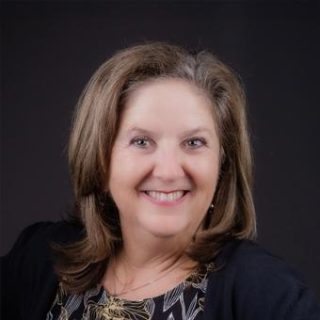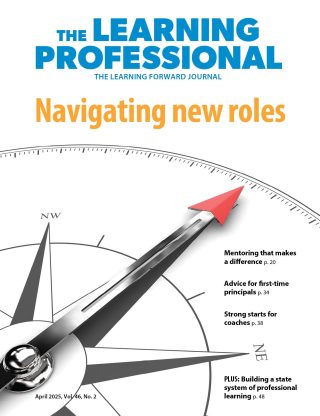FOCUS
Where do you want to get to?
Effective professional learning begins with a clear destination in mind
By Thomas R. Guskey
April 2017
Vol. 38 No. 2
Read the remaining content with membership access. Join or log in below to continue.
Sed ut perspiciatis unde omnis iste natus error sit voluptatem accusantium doloremque laudantium, totam rem aperiam, eaque ipsa quae ab illo inventore veritatis et quasi architecto beatae vitae dicta sunt explicabo. Nemo enim ipsam voluptatem quia voluptas sit aspernatur aut odit aut fugit, sed quia consequuntur magni dolores eos qui ratione voluptatem sequi nesciunt. Neque porro quisquam est, qui dolorem ipsum quia dolor sit amet, consectetur, adipisci velit, sed quia non numquam eius modi tempora incidunt ut labore et dolore magnam aliquam quaerat voluptatem.
Thomas R. Guskey (guskey@uky.edu) is a professor of educational psychology at the University of Kentucky.
References
Ainsworth, L. & Viegut, D. (2006). Common formative assessments: How to connect standards-based instruction and assessment. Thousand Oaks, CA: Corwin Press.
Brennan, R.T., Kim, J., Wenz-Gross, M., & Siperstein, G.N. (2001). The relative equitability of high-stakes testing versus teacher-assigned grades: An analysis of the Massachusetts Comprehensive Assessment System (MCAS). Harvard Educational Review, 71(2), 173-216.
Covey, S.R. (2004). The seven habits of highly effective people. New York, NY: Free Press.
DuFour, R. (2004). What is a professional learning community? Educational Leadership, 61(8), 6-11.
Epstein, J.L. & Associates (2009). School, family, and community partnerships: Your handbook for action (3rd ed.). Thousand Oaks, CA: Corwin Press.
Guskey, T.R. (2000). Evaluating professional development. Thousand Oaks, CA: Corwin Press.
Guskey, T.R. (2001a). The backward approach. Journal of Staff Development, 22(3), 60.
Guskey, T.R. (2001b). Backward planning: An outcomes-based strategy for professional development. Curriculum in Context, 28(2), 18-20.
Guskey, T.R. (2002a). Does it make a difference? Evaluating professional development. Educational Leadership, 59(6), 45-51.
Guskey, T.R. (2002b). Professional development and teacher change. Teachers and Teaching: Theory and Practice, 8(3/4), 381-391.
Guskey, T.R. (2004). Organize principal support for professional development. JSD, 25(3), 8.
Guskey, T.R. (2005a). Five key concepts kick off the process: Professional development provides the power to implement standards. JSD, 26(1), 36-40.
Guskey, T.R. (2005b). Taking a second look at accountability. JSD, 26(1), 10-18.
Guskey, T.R. (2007a). Multiple sources of evidence: An analysis of stakeholders’ perceptions of various indicators of student learning. Educational Measurement: Issues and Practice, 26(1), 19-27.
Guskey, T.R. (2007b). Leadership in the age of accountability. Educational Horizons, 86(1), 29-34
Guskey, T.R. (2012). The rules of evidence. JSD, 33(4), 40-43.
Guskey, T.R. (2014a). Evaluating professional learning. In S. Billett, C. Harteis, & H. Gruber (Eds.), International handbook on research in professional and practice-based learning (pp. 1215-1235). New York, NY: Springer International.
Guskey, T.R. (2014b). Measuring the effectiveness of educators’ professional development. In K.L. Bauserman & L. Martin (Eds.), Handbook of professional development in education: Successful models and practices, PK-12. New York, NY: Guilford Press.
Guskey, T.R. & Bailey, J.M. (2001). Developing grading and reporting systems for student learning. Thousand Oaks, CA: Corwin Press.
Guskey, T.R. & Bailey, J.M. (2010). Developing standards-based report cards. Thousand Oaks, CA: Corwin Press.
Guskey, T.R. & Jung, L.A. (2013). Answers to essential questions about standards, assessments, grading, and reporting. Thousand Oaks, CA: Corwin Press.
Guskey, T.R., Roy, P., & von Frank, V. (2014). Reaching the highest standard in professional learning: Data. Thousand Oaks, CA: Corwin Press & Learning Forward.
Learning Forward. (2011). Standards for Professional Learning. Oxford, OH: Author.

Thomas R. Guskey, PhD, is Professor Emeritus in the College of Education, University of Kentucky. He is a longtime member of Learning Forward, best known for his work on teacher change and on planning, implementing, and evaluating effective professional learning. Contact him by email at guskey@uky.edu, on X at @tguskey, or at www.tguskey.com.
Recent Issues
LEARNING DESIGNS
February 2025
How we learn influences what we learn. This issue shares essential...
BUILDING BRIDGES
December 2024
Students benefit when educators bridge the continuum of professional...
CURRICULUM-BASED PROFESSIONAL LEARNING
October 2024
High-quality curriculum requires skilled educators to put it into...
LEARNING TO PIVOT
August 2024
Sometimes new information and situations call for major change. This issue...












